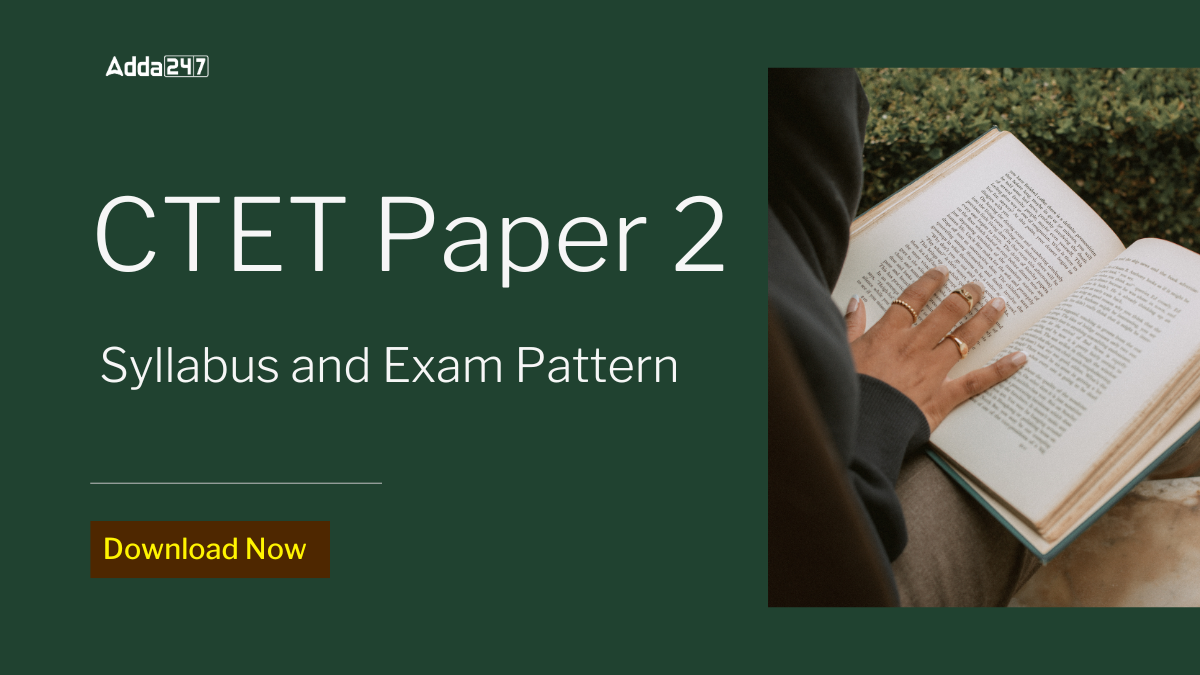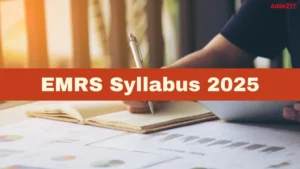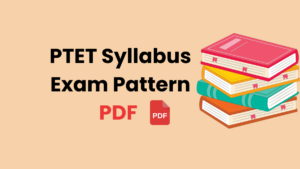Table of Contents
The CTET Paper 2 Syllabus 2026 has been officially released by CBSE on its website, and candidates preparing for the upcoming CTET exam should start by going through it carefully. A clear understanding of the subject-wise syllabus along with the exam pattern is essential for aspirants targeting Paper II, as it helps in planning focused and effective preparation. Knowing what topics to study and how much weight each section carries allows candidates to manage time better and improve their chances of qualifying. For a detailed and easy-to-understand explanation of the CTET Paper 2 Syllabus 2026, candidates can refer to the complete article.
CTET Paper 2 Syllabus 2026
The CTET Paper 2 Syllabus 2026 is structured to evaluate the readiness of candidates for Upper Primary Teacher positions for Classes VI to VIII across India. Qualifying Paper 2 makes candidates eligible for teaching roles in central government schools and other institutions that accept CTET certification. The syllabus includes Child Development and Pedagogy, Language I, Language II, and a subject-specific section where candidates choose either Mathematics and Science or Social Studies/Social Science based on their teaching preference. Along with testing subject knowledge, the syllabus focuses on educational psychology, effective teaching methods, and classroom application, helping candidates build the skills needed to handle real teaching challenges confidently.
CTET Answer Key 2026 – Click to Check
CTET Paper 2 Exam Pattern 2026
CTET Paper II includes 150 multiple-choice questions, with each question carrying 1 mark. There is no negative marking, so candidates can attempt all questions without fear of losing marks. The exam is held in offline, pen-and-paper mode and is divided into four sections. Candidates must select one subject group, either Mathematics and Science or Social Studies/Social Science, based on their specialization and teaching preference.
- CTET Exam will be conducted in 2 Parts: CTET Paper 1 & CTET Paper 2.
- CTET Paper I is for candidates aspiring to teach students in Classes I to IV. On the other hand, CTET Paper II is for candidates looking to teach students in Classes VI to VIII.
- Each subject comprises 30 questions, each carrying one mark, making a total of 30 marks per subject. A total of 150 Questions will be asked in each paper. Each question carries one mark
- There is no negative marking in the CTET Exam 2025.
- The CTET exam 2025 will take place in online mode as a computer-based test.
- Candidates can select any two languages from the available options to take the Language I and Language II exams.
- Paper 2 has four sections: Child Development and Pedagogy, Language 1, Language 2, and either Mathematics/Science or Social Studies.
CTET Paper 2 Marks Distribution
The CTET Paper 2 Marks Distribution outlines the structure of the exam, helping candidates understand the weightage of different sections.
| CTET Paper 2 Marks Distribution | ||
| Subjects | Important Topics | Questions |
| Child Development and Pedagogy |
|
30 |
| Language-I |
|
30 |
| Language-II |
|
30 |
| Mathematics |
|
30 |
| Science |
|
30 |
| Social Studies |
|
60 |
CTET Paper 2 Syllabus (Subject Wise)
The CTET Paper II syllabus is designed to assess the knowledge and teaching aptitude of candidates aspiring to teach Classes VI to VIII. It comprises five key sections, each evaluating both subject understanding and pedagogical skills. This structure ensures that candidates are well-prepared to address the diverse learning needs of upper primary students effectively.
I. Child Development and Pedagogy Syllabus- 30 Questions
Child Development and Pedagogy is one of the most important sections in the CTET exam, focusing on conceptual and theoretical understanding. It evaluates a candidate’s grasp of educational principles and teaching concepts. This section contains 30 questions, with each correct answer awarding 1 mark. Candidates can score well by studying each topic thoroughly and building a strong foundation in child development and learning methodologies.
a) Child Development (Elementary School Child)-15 Questions
- Concept of development and its relationship with learning
- Principles of the Development of Children
- Influence on Heredity & Environment
- Socialization processes: Social world & children (Teacher, Parents, Peers)
- Piaget, Kohlberg, and Vygotsky: constructs and critical perspectives
- Concepts of child-centred and progressive education
- Critical Perspective of the Construct of Intelligence
- Multi-Dimensional Intelligence
- Language & Thought
- Gender as a social construct: gender roles, gender bias, and educational practice
- Individual differences among learners, understanding differences based on diversity of language, caste, gender, community, religion, etc.
- The distinction between Assessment for learning and Assessment of learning; School-Based Assessment, Continuous and Comprehensive Evaluation: Perspective and practice
- Formulating appropriate questions for assessing readiness levels of learners, for enhancing learning and critical thinking in the classroom, and for assessing learner achievement.
b) Concept of Inclusive education and understanding children with special needs Questions
- Addressing learners from diverse backgrounds, including disadvantaged and deprived
- Addressing the needs of children with learning difficulties, ‘impairment’, etc.
- Addressing the Talented, Creative, and Specially abled Learners
c) Learning and Pedagogy-10 Questions
- How children think and learn; how and why children ‘fail’ to achieve success in school performance.
- Basic processes of teaching and learning; children’s strategies of learning; learning as a social activity; social context of learning.
- Child as a problem solver and a ‘scientific investigator.’
- Alternative conceptions of learning in children, understanding children’s errors as significant steps in the learning process.
- Cognition & Emotions
- Motivation and learning
- Factors contributing to learning – personal & environmental
II. Language I Syllabus (30 Questions and 30 Marks)
Language 1 in the CTET exam evaluates a candidate’s proficiency in the medium of instruction they plan to use as a teacher. Although this section is seen as scoring potential, it necessitates comprehensive preparation and a strong command of the chosen language.
a) Language Comprehension-15 Questions
Reading unseen passages – two passages, one prose or drama and one poem, with questions on comprehension, inference, grammar, and verbal ability (Prose passage may be literary, scientific, narrative, or discursive)
b) Pedagogy of Language Development-15 Questions
- Learning and acquisition
- Principles of Language Teaching
- Role of listening and speaking; function of language, and how children use it as a tool
- A critical perspective on the role of grammar in learning a language for communicating ideas verbally and in written form.
- Challenges of teaching language in a diverse classroom: language difficulties, errors, and disorders
- Language Skills
- Evaluating language comprehension and proficiency: speaking, listening, reading, and writing
- Teaching-learning materials: Textbook, multimedia materials, multilingual resources of the classroom
- Remedial Teaching
- IT as a Tool (New Topic)
III. Language II Syllabus (30 Questions)
Language 2, like Language 1, focuses on key concepts vital for effective communication. This section specifically addresses aspects of language such as grammar, vocabulary, and comprehension skills.
a) Comprehension-15 Questions
Two unseen prose passages (discursive or literary narrative or scientific) with questions on comprehension, grammar, and verbal ability.
b) Pedagogy of Language Development -15 Questions
- Learning and acquisition
- Principles of Language Teaching
- Role of listening and speaking; function of language, and how children use it as a tool
- A critical perspective on the role of grammar in learning a language for communicating ideas verbally and in written form.
- Challenges of teaching language in a diverse classroom: language difficulties, errors, and disorders
- Language Skills
- Evaluating language comprehension and proficiency: speaking, listening, reading, and writing
- Teaching-learning materials: Textbook, multimedia materials, multilingual resources of the classroom
- Remedial Teaching
IV. (A) Mathematics and Science Syllabus (60 Questions)
(i) Mathematics-30 Questions
The mathematics syllabus is lengthy and tough, but the level of questions asked in the exam is easy to moderate. Most questions were asked from the NCERT Class 6th to 8th.
a) Content-20 Questions
(i) Number System
- Knowing our Numbers
- Playing with Numbers
- Whole Numbers
- Negative Numbers and Integers
- Fractions
(ii) Algebra
- Introduction to Algebra
- Ratio and Proportion
(iii) Geometry
- Basic geometrical ideas (2-D)
- Understanding Elementary Shapes (2-D and 3-D)
- Symmetry: (reflection)
- Construction (using Straight edge Scale, protractor, compasses)
- Mensuration
- Data handling
b) Pedagogical issues-10 Questions
- Nature of Mathematics/Logical Thinking
- Place of Mathematics in Curriculum
- Language of Mathematics
- Community Mathematics
- Evaluation
- Remedial Teaching
- Problem of Teaching
Sciences Syllabus (30 Questions)
The Science section in CTET Paper II can seem extensive, but the questions are generally of moderate difficulty, focusing on a clear understanding of basic concepts. It includes 30 questions covering Chemistry, Physics, and Biology, based on the NCERT syllabus for Classes 6 to 8. While the questions primarily test foundational knowledge, some may be framed at a level comparable to senior secondary standards.
a) Content-20 Questions
I. Food
- Sources of food
- Components of food
- Cleaning food
II. Materials
- Materials of daily use
III. The World of the Living
IV. Moving Things, People, and Ideas
V. How things work
- Electric current and circuits
- Magnets
VI. Natural Phenomena
VII. Natural Resources
b) Pedagogical issues-10 Questions
- Nature & Structure of Sciences
- Natural Science/Aims & Objectives
- Understanding & Appreciating Science
- Approaches/Integrated Approach
- Observation/Experiment/Discovery (Method of Science)
- Innovation
- Text Material/Aids
- Evaluation – cognitive/psychomotor/affective
- Problems
- Remedial Teaching
V. Social Science Syllabus (60 Questions)
The Social Studies/Social Science section in CTET Paper II covers History, Geography, Polity, Economics, and Pedagogy, making it a comprehensive area that requires thorough preparation. Questions are based on the NCERT syllabus for Classes 6 to 8, though some may reach senior secondary-level difficulty. This section contains 30 questions, so candidates should ensure a strong grasp of all prescribed topics to perform well in the exam.
a) Content-40 questions.
History
- When, Where, and How
- The Earliest Societies
- The First Farmers and Herders
- The First Cities
- Early States
- New Ideas
- The First Empire
- Contacts with Distant Lands
- Political Developments
- Culture and Science
- New Kings and Kingdoms
- Sultans of Delhi
- Architecture
- Creation of an Empire
- Social Change
- Regional Cultures
- The Establishment of Company Power
- Rural Life and Society
- Colonialism and Tribal Societies
- The Revolt of 1857-58
- Women and Reform
- Challenging the Caste System
- The Nationalist Movement
- India After Independence
II. Geography
- Geography as a social study and as a science
- Planet: Earth in the solar system
- Globe
- The environment in its totality: natural and human environment
- Air
- Water
- Human Environment: settlement, transport, and communication
- Resources: Types-Natural and Human
- Agriculture
III. Social and Political Life
- Diversity
- Government
- Local Government
- Making a Living
- Democracy
- State Government
- Understanding Media
- Unpacking Gender
- The Constitution
- Parliamentary Government
- The Judiciary
- Social Justice and the Marginalised
b) Pedagogical issues-20 Questions
- Concept & Nature of Social Science/Social Studies
- Class Room Processes, activities, and Discourse
- Developing Critical Thinking
- Inquiry/Empirical Evidence
- Problems of Teaching Social Science/Social Studies
- Sources – Primary & Secondary
- Projects Work
- Evaluation
CTET Paper 2 Syllabus PDF Download
The CTET syllabus for 2 has been detailed in an article released by CBSE. You can now access the updated Paper 2 syllabus PDF, which covers all topics and the exam pattern. The syllabus has been revised to align with the latest CET exam structure. To help the aspirants, we have provided the CTET Syllabus PDF download link below.
| CTET Paper II Syllabus | |
| CTET Syllabus for Paper 2 | Click Here to Download |




 EMRS Syllabus 2026, Check Tier 2 Exam Pa...
EMRS Syllabus 2026, Check Tier 2 Exam Pa...
 Oil India TGT PGT Syllabus 2026, PDF Dow...
Oil India TGT PGT Syllabus 2026, PDF Dow...
 Rajasthan PTET 2026 Syllabus, Check Exam...
Rajasthan PTET 2026 Syllabus, Check Exam...













